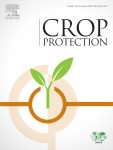Trichoderma atroviride LR28 as a potential biocontrol agent against Thecaphora frezzii and inductor of biochemical responses in peanut
Autor: Paredes, Juan Andrés; Guzzo, María Carla; Bernanrdi Lima, Nelson; Pérez, A.; González, N.R.; Monguillot, Joaquín Humberto; Posada, Gisella Anabel; Monteoliva, Mariela Ines; Rago, Alejandro Mario; Valetti, Lucio
Peanut smut (caused by the pathogenic fungi Thecaphora frezzii) is one of the most relevant diseases regarding peanut (Arachis hypogaea L.) productivity in Argentina.
Cultural strategies have not been successful in controlling the disease. Chemical strategies are the ones that offer acceptable control, but they have low adoption rates and erratic effects. To find a biocontroller that offers a low environmental and economic cost control strategy, we assessed the antagonistic capacity of 14 Trichoderma isolates against T. frezzii. We selected the four with the highest antagonistic effect in vitro and tested them in pot and field assays. A principal component analysis highlighted the LR28 strain as the most effective biocontrol agent. We molecularly identified LR28 as Trichoderma atroviride. Lastly, the reduction of smut incidence induced by T. atroviride LR28 was associated with the modulation of the osmotic and redox balance in a pot assay. Our results proposed Trichoderma atroviride LR28 as a promising biocontrol agent for managing peanut smut disease in the Argentinian peanut production region.
Para ver el contenido completo, ingrese al repositorio institucional INTA Digital
